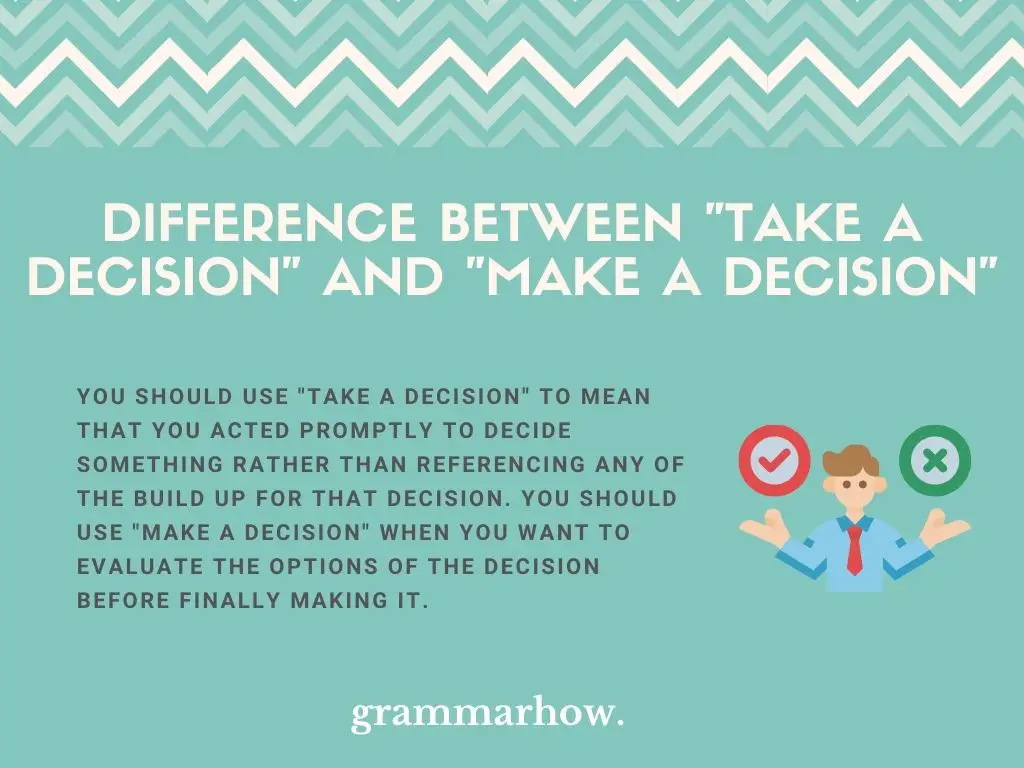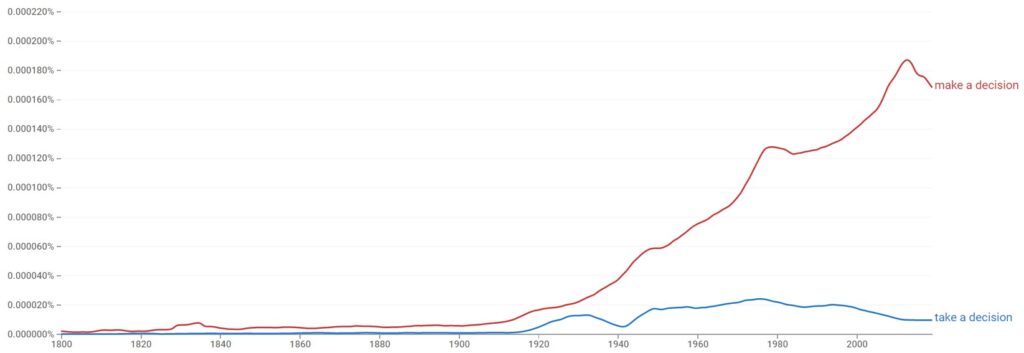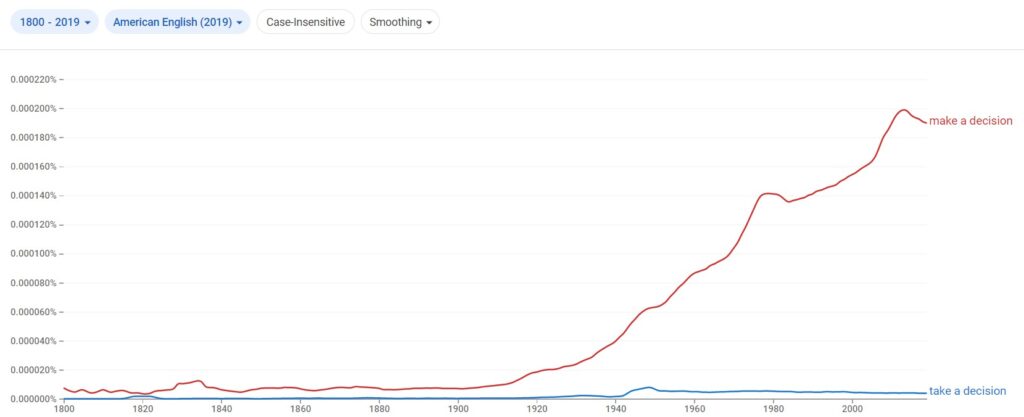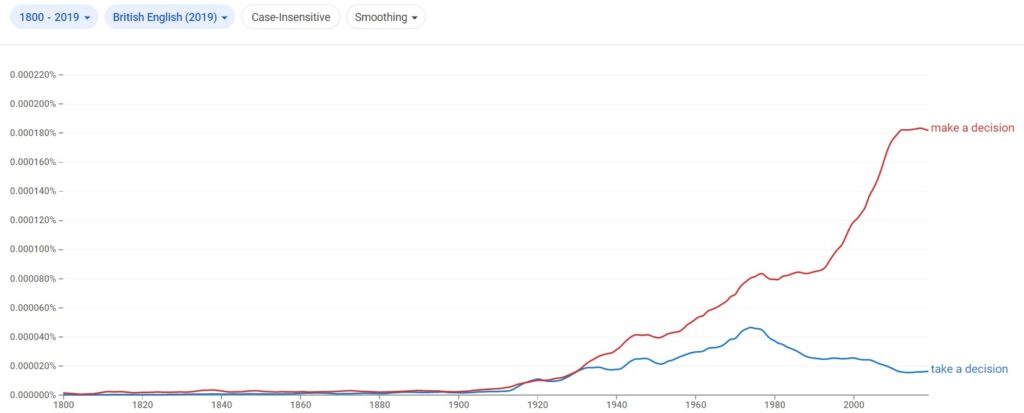When using “take a decision” and “make a decision,” it’s important to understand the differences. They don’t mean the same thing, and many people confuse them. This article will look at what each one means and how you can use them yourself.
What Is The Difference Between “Take A Decision” And “Make A Decision”?
You should use “take a decision” to mean that you acted promptly to decide something rather than referencing any of the build up for that decision. You should use “make a decision” when you want to evaluate the options of the decision before finally making it.

Typically, “make a decision” means a process. This process has to take place if you want the decision to be the best possible one you can make. Conversely, “take a decision” is something that happens straight away, and there is no way to deliberate further.
You can always have the decision-making process as part of a decision, even if you “take” it. However, the meaning of “take a decision” ignores the process that got us to the final decision and simply looking at the impact of the overall choice.
Is “Take A Decision” Or “Make A Decision” Used The Most?
It’s likely that you’ll hear “make a decision” over “take a decision” in most cases. In fact, it’s very rare that “take a decision” is ever used. However, we’ve got the statistics that demonstrate all you need to know about the common usage of both words.
According to this graph, “make a decision” is more popular by far. It has steadily grown over the last few decades, while “take a decision” doesn’t seem to change much over the last two hundred years.

This graph is a great way of visualizing the differences between the two. Many native speakers avoid using “take a decision” because it doesn’t feel right. Instead, they’ll stick to “make a decision” to include the process of the choice as well, which takes some of the strain away.
Examples Of How To Use “Take A Decision” In A Sentence
If you’re struggling to understand when “take a decision” should be used, you’ve come to the right section. We’ve got some useful examples that’ll demonstrate exactly when you can use it and how we can get it to work for us.
“Take a decision” refers to the impact and final choice that you make. There is no going back, and there’s often no deliberation about the decision further than just making it.
- I took the decision to close this business before it was too late.
- I think it’s wise for you to take the decision and close.
- You should take the decision before things go wrong.
- Take a decision before the end of the day; I’ll be expecting an answer soon.
- I took the executive decision to end your activities, and I hope you don’t hate me for it.
- We took the decision together, and we don’t regret a thing.
- Have you ever taken a decision that made a difference?
As you can see, there are very limited cases where “take a decision” and “make a decision” aren’t synonymous. You’ll often find that most native speakers believe them to be interchangeable (even though they’re not).
However, it’s clear from the above examples that “take a decision” isn’t the most common variation. Instead, it’ll likely you’ll see “took the decision” or “take the decision” written down.
We use “the” instead of “a” to be more specific about whatever the decision is that we’re making. Without it, it’s rare that you’ll see “take a decision.”
Examples Of How To Use “Make A Decision” In A Sentence
“Make a decision” is by far the most popular choice. You’ll find most native speakers use it compared to any other form, which is why it’s so potent in the above graph and by far the more popular one.
“Make a decision” is used when you deliberate between choices and come to a final decision. Often, you’re able to spend more time in the thinking process when “making a decision.”
- I’d like to make a decision, but I don’t know which of these works best for me.
- We implore you to make the decision as soon as you’re able. It won’t be smart to delay.
- You should make a decision; otherwise, I’m going to leave you.
- I need to make a decision, but I can’t decide which one I like best!
- Can we agree to make a decision before we go any further with this?
- Let’s just make the decision already and move on! Okay?
- She should have made the decision by now. What’s taking her so long?
As you can see, there are plenty of forms of “make a decision,” like “made the decision,” “make the decision,” and all sorts of others. It’s important to understand how they all work before trying to use them yourself.
If you’re writing in the past tense, then “made the decision” works best, and we should use it as such. If you’re talking about a more pressing decision that needs an answer, generally, we use “make the decision,” where “the” acts as a more specific way to ask for a choice.
Is “Take A Decision” And “Make A Decision” Used Differently In American English And British English?
Sometimes, we’ll find key differences between words when we look at how we use them in American and British English. Some native speakers believe most dialect differences to come from this root over anything else.
According to this graph demonstrating American English usage of “take” and “make a decision,” “make a decision” is the only option with popularity. It’s rare to see “take a decision” in any capacity in American English.

In this graph, we can see the usage in British English. Here, “take a decision” is slightly more popular, though not by much. “Make a decision” is by far the most popular choice no matter which language you’re writing in.

American English and British English both use “make a decision” as the most common phrase. It’s rare for either language to use “take a decision.”
Is It Ever Correct To Use “Do A Decision”?
We might sometimes be able to change the verb before “decision” as well. We’ll look at using “do” as a verb to see if it matches up with “decision” and the meaning.
“Do a decision” is never correct to use. “Do” is a verb meaning that we completed an action, which is not synergistic with “decision.” The two words are not compatible, and we should not use them.
That’s why we use “make.” “Make” works well to allow us to show the process of the creation of the decision and the ultimate outcome. We “make” a decision because we’ve created it from the ground up.
We might also “take” a decision because it’s the final choice, and we’re simply grabbing hold of it and taking it away with us.
“Do” doesn’t work if we look at it in the same way since we can’t “do a decision” to complete it.
Is It “Took A Decision” Or “Made A Decision”?
We can also use the phrases in the past tense, and they’re still used in the same way. “Made a decision” is still the more popular choice compared with “took a decision.”
“Made a decision” and “took a decision” are both past tense forms of the phrase. We can use them when the decision has already occurred and nothing can be done to change that in the present.
Here are some examples to show you what we mean:
- I made the decision to stay.
- He made the decision yesterday.
- She took the decision to cancel it.
- We took the decision to move on.
All of these imply that the decision happened in the past and nothing can be done to change it.
What Is The Difference Between “Decide” And “Decision”?
“Decide,” and “decision” have the same root word, but they’re not the same thing.
You should use “decide” as a verb to talk about making a choice between things. You should use “decision” as a noun to talk about something that you’ve “decided” upon.
The definition of “decide,” according to The Cambridge Dictionary, is “to choose something, especially after thinking carefully about several possibilities.”
The definition of “decision,” according to The Cambridge Dictionary, is “a choice that you make about something after thinking about several possibilities.”
Take Or Make A Decision – Synonyms
Finally, let’s go over some synonyms that might help you come up with a better-suited word. With these, you won’t have to worry about the differences between “take a decision” or “make a decision.”
- Decide
- Make a choice
- Choose
- Determine
- Come to an agreement
- Arrive at
- Settle
- Conclude
- Come down to
- Make up your mind
All of these synonyms are great to replace “make a decision.” We can use verb forms like “decide” or “choose” to keep things simple, or we can use more complicated nouns like “make up your mind” or “come to an agreement.”

Martin holds a Master’s degree in Finance and International Business. He has six years of experience in professional communication with clients, executives, and colleagues. Furthermore, he has teaching experience from Aarhus University. Martin has been featured as an expert in communication and teaching on Forbes and Shopify. Read more about Martin here.
